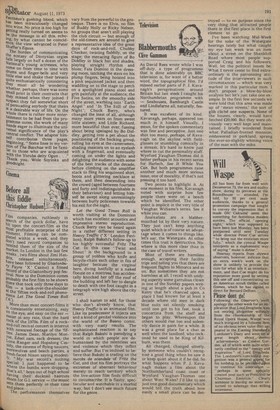Cinema,
Before all this fiddle
_Christopher Hudson
ilm companies, ruthlessly in search of the quick dollar, have hit upon the concert-film as the most profitable enterprise of the triornent. Filming can be comnleted within a week, and they don't need record companies to remind them of the size of the market. In London in the last few W,, eeks , two films about Jimi Hen"Ilk, released simultaneously, have been followed by GlastonburY Payre ` X ' Casino) a filmed record of the Glastonbury pop festival. Now to the Dominion comes Probably the first film to be shown there that took only three days to iifl — a look-over-the-shoulder at the 'fifties rock-and-roll phenoMerla Let The Good Times Roll
CA').
More than most concert-films it Is consistently entertaining, easy on the eye, and easy on the ear — easier at any rate, than the hard rock of the 1970s. Film of a rock4ncl-roll revival concert is intercut With newsreel footage of the 'fifties: James Dean, Marilyn Monroe, Edsel cars, sack dresses, the 1-9ne Ranger and Hopalong Cassidy, the cinema of flying saucers, werewolves and beach parties, a fresh-faced Nixon saying modest
" My war record's nothing sPecial: I just happened to be Where the bombs were dropping, that's all," boys out of high school having their ducktail haircuts Shorn for G.I. service — the music sets them perfectly in their time and place. rhe performances themselves vary from the powerful to the grotesque. There is no Elvis, no film of Buddy Holly or Ricky Nelson, no groups that aren't still playing the club circuit — but enough of the old-timers are around to give a representative idea of the great days of rock-and-roll. Chubby Checker, twisting flabbily, on the stage; the menacing figure of Bo Diddley in black hat and shades, playing straight rhythm and blues; Fats Domino in the dressing room, latching the stars on his plump fingers, being hoisted into a pink sequinned jacket and then waddling on to the stage to perch on a spotlighted piano stool and grin painfully at the audience; the Five Satins, on the smoochy side of the street, warbling into ' Earth Angel ' and ' In The Still of the Night '; Chuck Berry, who's changed the least of all, although many more years on from sweet little sixteen; and Little Richard, more beautiful than ever, fussing about being upstaged by Bo Diddley, getting into a pet about the positioning of the backing group, rolling his eyes at the cameramen, shading mascara on to an eyelash with a fingernail, and eventually coming on under the lights and delighting the audience with some of the best tracks of the decade, before climbing on the amplifier stack to fling his sequinned shirt, boots and glittering necklace at them, and then descending into the crowd (aged between fourteen and forty and indistinguishable in their behaviour) and letting himself be swept along unresistingly between burly policemen towards his exit for the night.
Let the Good Times Roll is worth visiting at the Dominion
which has excellent acoustics and impressive stereo reproduction. Chuck Berry can be heard again in a rather different setting in
Heavy Traffic (' X ' London Pavilion), Ralph Bakshi's follow-up to his highly successful Fritz The Cat. In this case ' Twist and Shout' is the background to a group of yobbos who knife and
bicycle-chain each other in fits of laughter because the virginal hero, diving lustfully at a naked floozie on a mattress, has acciden tally knocked her off the roof of the building and left her to dangle to death with one foot caught in a telegraph wire high above the city street.
I shall hasten to add, for those who don't already know, that Heavy Traffic is an animated film. Like its predecessor it injects sex and a kind of genital violence into the world of the Beano comic. with very nastyresults. The sophisticated reaction is to say that Ralph Bakshi is parodying a world in which people are dehumanised by the relentless sex and violence which they inflict and suffer. But I'm inclined to be lieve that Bakshi is trading on the succes de scandale of Fritz the
Cat, and that his film portrays the extremes of aberrant behaviour merely to reach territory which the live-action film finds difficult to circumscribe. It is flashy, spectacular and watchable in a morbid way, but I don't see much future for the genre.


































 Previous page
Previous page